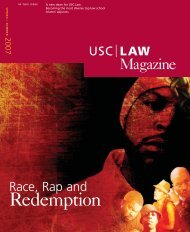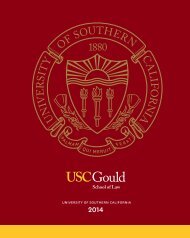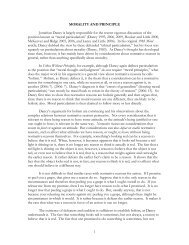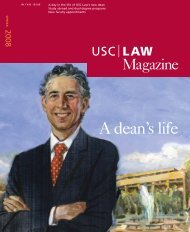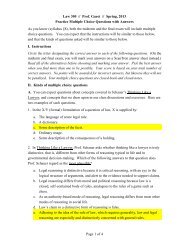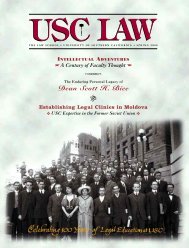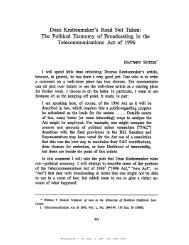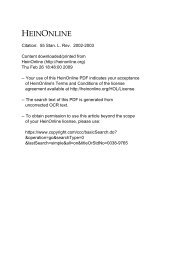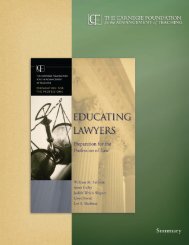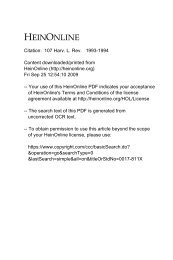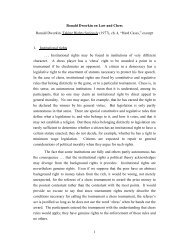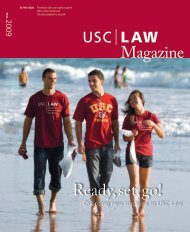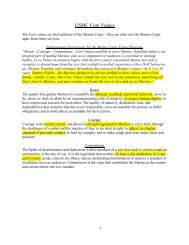download issue - USC Gould School of Law - University of Southern ...
download issue - USC Gould School of Law - University of Southern ...
download issue - USC Gould School of Law - University of Southern ...
Create successful ePaper yourself
Turn your PDF publications into a flip-book with our unique Google optimized e-Paper software.
Spring / Summer 2006<br />
Magazine<br />
Feature<br />
21<br />
Angeles, the <strong>University</strong> <strong>of</strong> California, San Diego, and the <strong>University</strong><br />
<strong>of</strong> San Diego. The center encompasses a diverse range <strong>of</strong> disciplines,<br />
including law, political science, economics, public administration,<br />
psychology and communication. Since 2004, it also has included the<br />
Initiative and Referendum Institute, the nation’s most prominent<br />
educational and research organization on direct democracy.<br />
<strong>USC</strong> <strong>Law</strong>’s other centers include faculty from a wide range <strong>of</strong><br />
fields and typically have co-directors from other units on campus.<br />
The Center for Communication <strong>Law</strong> and Policy is a joint venture<br />
with the <strong>USC</strong> Annenberg <strong>School</strong> for Communication. The Center<br />
for <strong>Law</strong>, History and Culture and the Center for <strong>Law</strong> and<br />
Philosophy both are partnerships with the College <strong>of</strong> Letters,<br />
Arts & Sciences. The Pacific Center for Health Policy and Ethics<br />
includes faculty from medicine, occupational therapy, anthropology,<br />
public policy and communication.<br />
This fall, Pr<strong>of</strong>essor <strong>of</strong> <strong>Law</strong> and History Daniel Klerman will<br />
head the Center in <strong>Law</strong>, Economics and Organization, which draws<br />
upon resources from the College, the economics department and<br />
the <strong>USC</strong> Marshall <strong>School</strong> <strong>of</strong> Business. Through his affiliation with<br />
CLEO, Klerman — whose scholarship concentrates on English<br />
legal history and law and economics — has begun collaborating<br />
with Timur Kuran, a <strong>USC</strong> economist with a joint appointment<br />
at the law school. Kuran runs the <strong>USC</strong> Institute for Economic<br />
Research on Civilizations, and his research focuses on law and institutions<br />
in the Islamic world. The pair are co-planning a conference.<br />
“The centers are living, breathing symbols <strong>of</strong> what <strong>USC</strong><br />
scholarship is about,” says Edward McCaffery, the Robert C. Packard<br />
Trustee Chair in <strong>Law</strong> and Political Science, a visiting pr<strong>of</strong>essor at<br />
Caltech and an internationally recognized expert in tax law. “It’s<br />
less unusual than it used to be, but a sophisticated, multidisciplinary<br />
AN EYE FOR TALENT<br />
Brian Leiter, a pr<strong>of</strong>essor at the <strong>University</strong> <strong>of</strong> Texas at Austin who<br />
runs the best-read blog on legal academics, calls <strong>USC</strong>’s “keen eye<br />
for the very best young legal scholars … the stuff <strong>of</strong> ‘legend’ in<br />
the legal academy.” Part <strong>of</strong> this comes from the school’s commitment<br />
to interdisciplinary learning and to developing young talent.<br />
“We’ve been doing interdisciplinary scholarship for a long<br />
time, and the people we hire as junior faculty get it early in their<br />
career,” Shapiro says. “When we expose them to effective interdisciplinary<br />
work, they soak it up, and it becomes a part <strong>of</strong> them.<br />
The scholarship process requires the mutual interaction <strong>of</strong> ideas,<br />
which is a benefit to the entire faculty.”<br />
Dean Spitzer points out that untenured pr<strong>of</strong>essors get first pick<br />
at workshop dates. In fact, Kareem Crayton, an election law and<br />
voting rights scholar, and James Spindler, an expert in corporate<br />
law, presented papers just months after joining <strong>USC</strong> in fall 2004.<br />
“The mentorship that I get from my senior colleagues is<br />
incomparable,” says Crayton, previously a fellow and instructor<br />
<strong>of</strong> law at Vanderbilt <strong>University</strong>. “When I ask for their comments,<br />
I always expect a fresh and helpful perspective on my research.<br />
They’re energetic, versatile, and frankly, they’re just plain nice<br />
people to work with.”<br />
The special attention given to junior faculty has engendered<br />
enduring affection among former faculty members who forever<br />
consider themselves <strong>USC</strong> pr<strong>of</strong>essors, says Margaret Jane Radin ’76,<br />
now at Stanford and soon to be heading to the <strong>University</strong> <strong>of</strong><br />
Michigan. Both Radin and Stephen Morse, now at Penn, recall<br />
the school’s centennial celebration as a “classic” <strong>USC</strong> <strong>Law</strong> event,<br />
featuring daylong academic workshops in which current and past<br />
faculty presented papers.<br />
“... a sophisticated, multidisciplinary focus permeates<br />
us more than any other law school in the country.”<br />
focus permeates us more than any other law school in the country.<br />
Here, it’s the norm that you have another discipline or that you<br />
become fluent in several <strong>of</strong> them.”<br />
Michael Knoll, an associate dean at the <strong>University</strong> <strong>of</strong><br />
Pennsylvania <strong>Law</strong> <strong>School</strong> and former pr<strong>of</strong>essor at <strong>USC</strong> <strong>Law</strong>,<br />
adds that <strong>USC</strong> was well ahead <strong>of</strong> the curve in the evolution<br />
<strong>of</strong> legal scholarship.<br />
“Most law schools today have a substantial component <strong>of</strong><br />
interdisciplinary work, but <strong>USC</strong> was a real innovator,” he says.<br />
“And <strong>USC</strong> continues to woo some <strong>of</strong> the best scholars in a much<br />
more competitive world today.”<br />
“<strong>USC</strong> invited all <strong>of</strong> the people who’d been on faculty to<br />
attend, and virtually everyone showed up,” says Morse. “We stay<br />
in touch pr<strong>of</strong>essionally and personally, and frequently talk about<br />
how wonderful it was to be on the faculty at <strong>USC</strong>, how sad we are<br />
not to be there, and how much we miss it. We couldn’t imagine a<br />
more exciting place to be a law pr<strong>of</strong>essor.”




